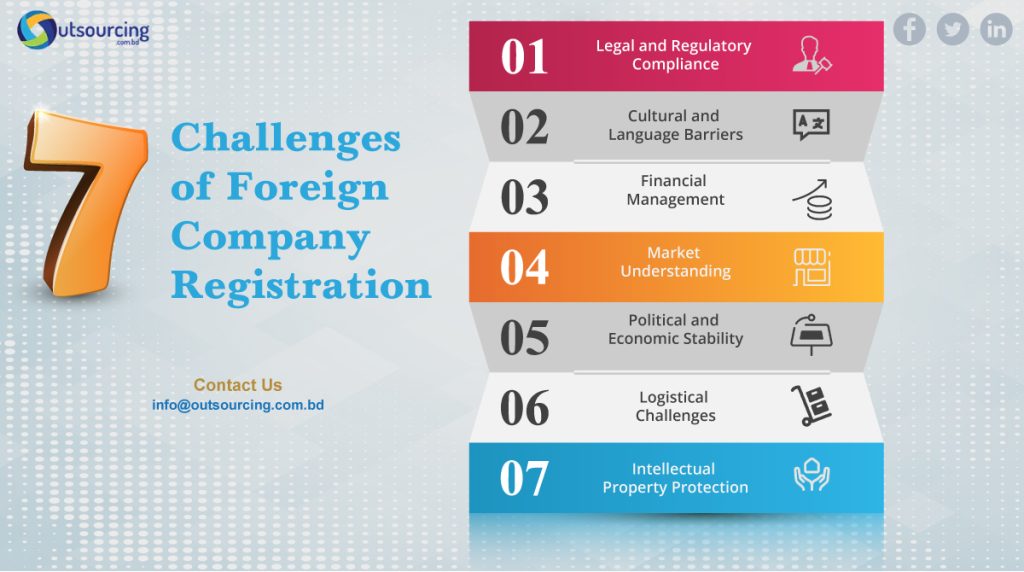Foreign company registration is crucial for business growth as it opens the doors to international markets, offering diverse opportunities for revenue generation and expansion.
By establishing a presence in a foreign country, businesses can access new customer segments, adapt to different market demands, and gain a competitive edge through global exposure.
This strategic move often leads to increased brand recognition and credibility, as operating internationally is seen as a marker of a successful and robust business.
Additionally, foreign registration can provide operational advantages such as access to favorable tax regimes, subsidies, or less stringent regulatory environments. It also allows companies to mitigate risks by diversifying their market dependence.
Moreover, tapping into international talent pools can bring in new perspectives and innovation, further driving business growth and development.
Does a Small Business Have the Ability to Foreign Company Registration?
Small businesses certainly possess the ability to register as foreign entities, a move that can be strategically advantageous. While the process can be complex, involving navigation through various legal and regulatory landscapes, it’s entirely feasible with proper planning and resources.
Key considerations for small businesses going global include learning the target country’s legal rules, adjusting to its culture and business practices, and finances. Technological advancements have simplified global operations and communication for small enterprises.
Moreover, many countries offer incentives to attract foreign businesses, which can include small enterprises. Despite the challenges, expanding internationally can offer significant growth opportunities, such as access to new markets, and diversification of market risk.
However, small businesses need to conduct thorough market research, align with local partners, and be prepared for the additional responsibilities that come with operating in a foreign market.
There were roughly 333.34 million companies worldwide in 2021, a slight increase from the approximately 328 million companies reported in both 2019 and 2020.

Challenges of Foreign Company Registration
Registering a company in a foreign country presents several challenges:
- Legal and Regulatory Compliance: Adhering to the foreign country’s legal frameworks and regulatory standards.
- Cultural and Language Barriers: Navigating language and cultural norms differences is crucial for effective communication and business operations.
- Financial Management: Dealing with foreign currency transactions, tax regulations, and different banking systems.
- Market Understanding: Gaining insights into the local market dynamics, consumer behavior, and competition.
- Political and Economic Stability: Assessing the risks associated with the political and economic environment of the host country.
- Logistical Challenges: Managing the logistics of setting up and running a business in a different country, including supply chain and distribution networks.
- Intellectual Property Protection: Ensuring the safety of trademarks, patents, and other intellectual properties in a foreign jurisdiction.
How to Overcome Foreign Company Registration Barriers
Overcoming barriers to foreign company registration involves several strategic steps:
- Research and Planning: Conduct thorough research on the target country’s market, legal requirements, and cultural norms. Develop a comprehensive business plan that addresses these specifics.
- Legal and Regulatory Compliance: Engage with local legal experts or consulting firms familiar with the country’s business laws and regulations.
- Cultural Adaptation and Language Proficiency: Understanding and respecting local customs and business etiquette is crucial. Hiring local staff or interpreters can bridge language barriers and facilitate smoother operations.
- Financial Management Strategy: Develop a robust financial strategy that includes managing currency risks, understanding local tax obligations, and setting up efficient banking and accounting practices.
- Building Local Networks and Partnerships: Connect with local businesses, industry associations, and chambers of commerce. This can provide valuable insights, resources, and support.
- Risk Assessment and Mitigation: Conduct a detailed risk analysis considering political, economic, and market risks. Develop strategies to mitigate these risks.
- Intellectual Property Protection: Secure your intellectual property rights in a foreign country by registering patents, trademarks, and copyrights as necessary.
How to Choose the Right Country for Your Foreign Company Registration?
Choosing the right country for foreign company registration is a critical decision that hinges on several factors. Consider the market potential: analyze the customer base, demand for your products or services, and the level of competition.
Evaluate the political and economic stability of the country, as this impacts the business environment and investment security. It’s also crucial to assess the legal and regulatory framework, including tax laws, repatriation rules, and intellectual property protection.
Additionally, it examines the availability and cost of labor, as well as the infrastructure in terms of technology, transportation, and logistics. Cultural compatibility should be considered, as understanding and business practices can be pivotal for success.
Finally, consider any existing trade agreements or incentives for foreign businesses that might benefit your venture. A thorough analysis of these aspects will guide you in selecting a country that aligns best with your business goals and risk appetite.
Foreign Company Registration Process
The streamlined foreign company registration process, though complex, is essential for successfully setting up a business in a foreign country. The process of foreign company registration typically involves several key steps, which can vary depending on the country. Here’s a general outline of the process:
- Research and Planning
- Choosing a Legal Entity Type
- Name Reservation and Approval
- Legal Documentation
- Obtaining Licenses and Permits
- Tax Registration and Bank Accounts
- Employer Registrations
- Office and Physical Presence
- Local Agent or Representative
- Compliance with Local Laws
- Ongoing Compliance and Reporting
How Can You Ensure Compliance with International Business Laws?
To ensure compliance with international business laws, businesses must first thoroughly understand the legal landscape in each country of operation. This involves keeping up-to-date with local laws and regulations across various domains, such as labor, taxation, and trade.
Engaging legal experts with international and local knowledge is crucial for accurate guidance and interpretation of these laws. Regular training of employees on legal compliance and ethical practices is important to instill a culture of adherence to legal standards.
Implementing internal policies and procedures that align with each country’s legal framework is essential. Leveraging technology to track regulatory changes and streamline compliance processes can also be beneficial.
Additionally, conducting regular audits and assessments helps in identifying and addressing any compliance gaps. By adopting these strategies, businesses can effectively navigate the complexities of international legal compliance and minimize the risk of legal issues.
Difference Between Foreign Company Registration Vs Local Company Registration
Certainly, here’s a simplified table highlighting the key differences between foreign company registration and local company registration:
| Aspect | Foreign Company Registration | Local Company Registration |
| Location | Different country/jurisdiction | Same country/jurisdiction |
| Compliance | Subject to foreign and local regulations | Governed primarily by local laws and regulations |
| Taxation | May involve dual taxation, subject to foreign and local tax laws | Primarily subject to local tax laws |
| Reporting | Involves additional cross-border reporting requirements | Typically follows standard local reporting |
| Brand Protection | Requires considerations for multinational brand protection | Focuses primarily on local brand protection |
| Market Access | Provides access to global markets and international expansion | Focused on the local market and potential regional expansion |
| Legal Complexity | Typically involves more legal complexity due to multiple jurisdictions | Simpler legal processes within a single jurisdiction |
How Does Company Incorporation Impact Raising Capital for Your Business?
Company incorporation significantly impacts the process of raising capital for a business. When a business is incorporated, it becomes a separate legal entity, which can enhance its credibility and attractiveness to potential investors and lenders.
This legal structure often makes it easier to secure funding from venture capitalists, angel investors, or through public offerings, as investors are generally more comfortable investing in a corporation rather than a sole proprietorship or partnership.
Additionally, Incorporation grants shareholders limited liability, safeguarding personal assets, and opens various fundraising avenues for businesses, including issuing stocks and bonds.
However, Incorporation broadens capital-raising opportunities but also demands strict compliance with legal and financial regulations. This necessitates careful planning to ensure adherence and effective fund management.
Why Should You Opt for a Company Incorporation for Your Small Business?
Opting for company incorporation for your small business offers several key benefits:
- Limited Liability Protection: Incorporation separates your assets from the business, protecting them from business debts and legal liabilities.
- Enhanced Credibility: An incorporated business often gains more trust from suppliers, customers, and potential investors, enhancing your professional image.
- Access to Capital: Incorporation can make it easier to raise money, as you can issue shares and attract investors.
- Tax Advantages: Corporations can benefit from tax efficiencies and deductions that might not be available to unincorporated businesses.
- Perpetual Existence: A corporation continues to exist even if the owner changes or passes away, providing long-term stability.
- Ownership Transferability: Shares of a corporation can be sold or transferred more easily than ownership stakes in other business structures.
How Does Company Incorporation Protect Your Assets?
Company incorporation can provide a crucial layer of asset protection for business owners. When you incorporate a company, it becomes a separate legal entity distinct from its owners, often referred to as shareholders.
In the event of financial troubles or legal disputes, the personal assets of shareholders, such as their homes or savings, are shielded from potential claims or creditors seeking to collect from the company.
However, it’s essential to maintain proper corporate formalities and avoid commingling personal and business finances to preserve this protection. This separation means that the company’s debts and liabilities are typically not the personal responsibility of the shareholders.
Additionally, the extent of asset protection can vary depending on the legal structure chosen and the jurisdiction in which the company is incorporated. Consulting with legal and financial professionals is advisable to ensure compliance and maximize asset protection benefits.
Why Choose Professional Company Formation Services?
Choosing professional company formation services offers several key advantages:
- Expertise: Professionals have extensive knowledge of legal and administrative requirements, ensuring compliance with regulations.
- Time Efficiency: They streamline the process, saving you valuable time and allowing you to focus on your business.
- Accuracy: Professionals reduce the risk of errors or omissions in paperwork, preventing potential setbacks.
- Legal Guidance: They provide valuable legal advice, helping you make informed decisions about business structure and compliance.
- Registered Agents: Many services include registered agent services, ensuring you receive important legal documents promptly.
- Credibility: Professionally formed companies often appear more credible to investors, partners, and clients.
- Peace of Mind: Knowing that experts are handling the formation process gives you peace of mind and reduces stress.
How Does Company Formation Provide Asset Protection?
Company formation provides a crucial layer of asset protection by legally separating the business entity from its owners or shareholders. When a company is incorporated or registered, it becomes its distinct legal entity, separate from the individuals who own it.
This separation means that the company’s debts, liabilities, and legal obligations are generally not considered the personal responsibility of the shareholders or owners. In the event of financial difficulties, legal disputes, or the company facing debts, the personal assets of the shareholders.
However, it’s essential to maintain proper corporate formalities, avoid commingling personal and business finances, and adhere to the laws and regulations of the chosen legal structure and jurisdiction to preserve this asset protection.
Consulting with legal professionals can help ensure compliance and maximize the benefits of asset protection offered by company formation.
Why is Company Formation Important for Small Businesses?
Company formation is vital for small businesses due to several key reasons:
- Legal Structure: It establishes a legal structure, such as an LLC or corporation, which provides liability protection for the owner’s assets.
- Credibility: Formal registration enhances the business’s credibility and trustworthiness in the eyes of customers, partners, and investors.
- Access to Capital: It facilitates access to funding sources like loans, grants, and investments, which can be essential for growth.
- Tax Benefits: Different legal structures offer various tax advantages, allowing small businesses to optimize their tax liabilities.
- Business Continuity: It provides a framework for business continuity, making it easier to transition ownership or secure the future of the company.
- Legal Compliance: Registering ensures compliance with local, state, and federal regulations, reducing the risk of legal issues.
- Brand Protection: It protects the business name and brand, preventing others from using a similar name within the same jurisdiction.
Why is Proper Company Registration Vital for Startups?
Proper company registration is of paramount importance for startups for several compelling reasons. It establishes a clear and legally recognized business structure, such as an LLC or corporation.
Additionally, registered startups gain access to a broader spectrum of funding options, including loans, grants, and investments, which are critical for fueling growth and innovation.
Furthermore, compliance with local, state, and federal regulations becomes more manageable, reducing the risk of legal entanglements that could hinder the startup’s progress.
Overall, proper company registration lays a solid foundation for startups, providing them with the legal, financial, and operational framework needed to thrive and succeed in the competitive business landscape.
How Does International Company Registration Work?
International company registration is the process of establishing a business presence in a foreign country or jurisdiction. It begins with selecting the location and legal structure that best suits the company’s goals, such as a subsidiary, branch office, or joint venture.
Understanding the specific regulatory and tax requirements of the chosen foreign jurisdiction is crucial. Typically, businesses will need to appoint a local registered agent or representative to navigate local regulations and liaise with government authorities.
The documentation and paperwork required for international registration vary by country but generally involve business plans, financial statements, and legal contracts. Seeking expert legal and financial advice is highly recommended to navigate the complexities of international registration successfully.
Ultimately, international company registration opens doors to global markets and opportunities. Still, careful planning and compliance with local laws are essential for a smooth and legally sound establishment of the business entity abroad.
How Can Company Registration Benefit Your Business?
Company registration offers several key benefits to businesses:
- Legal Entity: It establishes a distinct legal entity, separating business and personal assets, and protecting owners from personal liability.
- Credibility: Registered businesses often gain greater trust from customers, partners, and investors.
- Access to Capital: Registered entities have more access to funding sources, including loans, grants, and investments.
- Tax Advantages: Different legal structures offer various tax benefits, allowing businesses to optimize their tax liability.
- Business Continuity: Registration provides a framework for business continuity, easing ownership transitions and long-term planning.
- Legal Compliance: Registered businesses adhere to local, state, and federal regulations, reducing legal risks.
- Brand Protection: It safeguards the business name and brand, preventing others from using a similar name in the same jurisdiction.
Company Registration Documents List: Details
Here’s a simplified table listing the common documents needed for company registration:
| Document | Purpose |
| Articles of Incorporation | Defines the company’s purpose, structure, and operations. |
| Business Plan | Outlines the business strategy, goals, and financial projections. |
| Name Reservation | Confirms the availability and uniqueness of the business name. |
| Identification Documents | Personal identification of company directors and shareholders. |
| Ownership Structure | Details on the ownership distribution among shareholders. |
| Tax ID Number | Required for tax purposes and compliance. |
| Permits and Licenses | Documentation of permits and licenses relevant to the industry. |
| Operating Agreement | Governs the internal operations and decision-making processes. |
Choosing the Best Business Structure for Your New Company Formation
Selecting the best business structure for your new company formation is a critical decision with significant implications. The choice typically includes options like sole proprietorship, partnership, LLC, corporation, or others, each with its advantages and disadvantages.
Sole proprietorships offer simplicity but expose personal assets to business risks, while partnerships involve shared responsibilities and liabilities. LLCs provide a balance by shielding personal assets while offering flexibility in management and taxation.
Corporations, on the other hand, offer strong liability protection but involve more complex formalities. The ideal structure depends on factors like the nature of your business, tax considerations, funding needs, and long-term goals.
Seeking legal and financial counsel is essential to make an informed decision that aligns with your business objectives and minimizes potential risks.
Why is Planning for the Future Critical in New Company Formation?
Planning for the future in new company formation is crucial for long-term success:
- Sustainable Growth: Future planning helps set the stage for sustainable growth and scalability.
- Risk Mitigation: It allows for the identification and mitigation of potential risks and challenges.
- Financial Stability: Long-term financial strategies ensure stability and resilience in the face of economic fluctuations.
- Competitive Edge: Forward-thinking businesses can adapt to market trends and maintain a competitive edge.
- Exit Strategies: Planning includes developing exit strategies for ownership transitions or potential mergers and acquisitions.
- Innovation: Future planning encourages innovation and adaptation to changing customer needs and technological advancements.
Why Opt for Limited Company Formation Instead of Other Structures?
Opting for limited company formation over other business structures offers distinct advantages. Limited companies provide owners with limited liability protection, separating personal assets from business debts and obligations.
This safeguards personal wealth and assets in case of financial challenges. Additionally, limited companies often enjoy enhanced credibility, which can be beneficial when attracting investors, partners, or clients.
The flexibility of ownership structure, including the ability to issue shares, makes limited companies an attractive choice for startups and growing businesses. Tax benefits, such as favorable corporate tax rates, further contribute to their appeal.
Overall, choosing limited company formation can provide a solid legal and financial foundation for your business, combining liability protection, credibility, flexibility, and potential tax advantages.
Is It Feasible to Register a Limited Company Internationally?
Yes, registering a Limited Company internationally is feasible and can offer several advantages. International company registration allows businesses to expand their operations into global markets, access a broader customer base, and benefit from potential tax incentives and international trade opportunities.
However, the feasibility and process can vary significantly depending on the country or jurisdiction chosen. It often involves complying with local regulations, appointing a local representative or agent, and adhering to international trade laws.
Seeking professional legal and financial guidance is crucial to navigating the complexities and ensuring successful international company registration, making it a viable option for businesses looking to expand their global footprint.
Common Mistakes Should Avoid During the Limited Company Registration
Avoid these common mistakes during the limited company registration process:
- Business Structure: Select the appropriate legal structure for your business, considering factors like liability and taxation.
- Neglecting Compliance: Failure to meet regulatory requirements can lead to legal issues; stay informed and adhere to all legal obligations.
- Poor Financial Planning: Neglecting to create a solid financial plan can lead to financial instability and cash flow problems.
- Inadequate Documentation: Ensure all required paperwork is complete and accurate to avoid delays and complications.
- Failing to Seek Professional Advice: Consulting legal and financial experts can prevent costly errors and optimize your registration process.
- Commingling Finances: Keep personal and business finances separate to maintain limited liability protection.
- Choosing an Unsuitable Business Name: Select a unique and appropriate business name to prevent legal conflicts and confusion.
How Does Business Registration Impact Brand Protection?
Business registration plays a significant role in brand protection by legally safeguarding your company’s name and brand identity. When you register your business, especially if you choose a unique name.
You establish exclusive rights to use that name within the jurisdiction of registration. This exclusivity prevents others in the same region from operating under a similar name, reducing the risk of brand confusion and dilution.
Moreover, registration provides evidence of your brand’s existence and the date of establishment, which can be crucial in trademark disputes. It strengthens your legal position if you need to take action against trademark infringement.
Overall, business registration is an essential step in protecting your brand identity, enhancing its credibility, and ensuring that others do not capitalize on the reputation you’ve built.
Why Consider International Business Registration for Expansion?
Consider international business registration for expansion due to these key points:
- Local Presence: Registration establishes a local presence, gaining trust among foreign customers and partners.
- Legal Compliance: Ensures compliance with local regulations, reducing legal risks and barriers to entry.
- Tax Benefits: Some jurisdictions offer favorable tax incentives and structures for international businesses.
- Brand Protection: Protects your brand identity in multiple markets, preventing infringement by local businesses.
- Scaling Opportunities: International registration paves the way for scaling operations and capturing new opportunities worldwide.
- Competitive Edge: Positions your business competitively in global markets, fostering growth and profitability.
How Do International Tax Laws Affect Foreign Company Registration?
International tax laws can significantly impact the process and implications of foreign company registration. These laws determine how businesses are taxed on their income, profits, and activities when operating in multiple countries.
The specific impact on foreign company registration includes considerations such as transfer pricing rules, which regulate transactions between related entities in different countries to prevent profit shifting.
Additionally, understanding the tax treaties between the home country and the foreign jurisdiction is crucial, as these treaties can affect tax rates, withholding taxes, and the eligibility for tax credits and exemptions. Compliance with local tax regulations and reporting requirements is essential to avoid penalties and legal issues.
The complex nature of international tax laws makes it imperative for businesses to seek professional tax advice and engage in careful tax planning when considering foreign company registration to optimize their tax positions and ensure full compliance with the law.
5 Helpful Company Registration Tips for Small Business
Here are some helpful company registration tips for small businesses:
- Choose the Right Business Structure: Select a legal structure that suits your business needs, such as sole proprietorship, LLC, or corporation, and consider factors like liability and taxation.
- Unique Business Name: Pick a distinctive name for your business, ensuring it’s not already in use and is memorable to customers.
- Research Local Regulations: Understand the registration requirements, licenses, and permits specific to your industry and location.
- Professional Assistance: Consider hiring legal and financial professionals who specialize in business registration to ensure compliance and accuracy.
- Tax Considerations: Be aware of the tax implications of your chosen structure and plan accordingly for future tax obligations.
Conclusion
Company registration is a critical step for businesses, irrespective of their size. It provides a legal framework, offers protection to personal assets, and establishes credibility in the eyes of customers, partners, and investors.
Selecting the right business structure, choosing a unique business name, and adhering to local regulations are fundamental aspects of the process. Seeking professional assistance, maintaining financial practices, and being informed about tax obligations are essential for long-term success.
With proper registration and ongoing compliance, businesses can focus on growth, innovation, and achieving their goals while minimizing legal risks and maximizing opportunities for success.
FAQs
How long does the company registration process take?
The registration timeline varies depending on factors such as location, business structure, and government processing times. It can take anywhere from a few days to several weeks.
Why is company registration important?
Company registration is important because it provides a legal structure for the business, separates personal and business assets, enhances credibility, and ensures compliance with local regulations.
What is the process for registering a company?
The process typically involves selecting a business name, completing registration forms, paying registration fees, and complying with local regulations. It may vary depending on the chosen structure and location.
How does company registration affect taxes?
Company registration can impact tax obligations, and different structures have varying tax implications. It’s essential to understand the tax requirements and benefits associated with your chosen structure.
What documents are required for company registration?
The required documents may vary by jurisdiction and business structure but often include articles of incorporation or organization, business plans, and financial statements.






